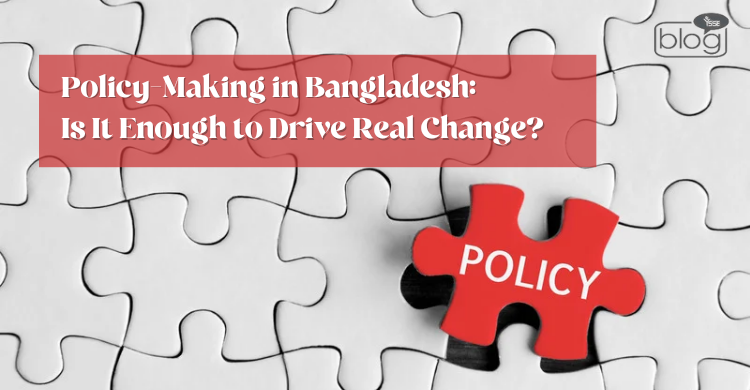Policy is a word that carries a significant weight. Now what is the definition of policy? Policy is a law, procedure, regulations and administrative action of government and other institutions. Making policies is not a one-off process ; rather it involves a vast and complicated system. Phases in the policy making are issue identification, policy formulation, policy pre evaluation, decision making, implementation, evaluation. But the main purpose of policy making is enough to drive change in Bangladesh perspective?
Bangladesh is a country of different cultured people. There are different beliefs, different colors. Bangladesh has so much potential to make a mark on the world’s dictionary. In many sectors Bangladesh already stands out by the progressive thoughts of its people and resilience. If we really want to make Bangladesh a developed and progressed country, policy will play a crucial role. As I mentioned earlier, policy has some phases. In terms of Bangladesh policy, we can surely see some gaps. Not practicing inclusivity makes it more hard as the country has people from every class. This disconnect between policy design and ground realities can limit the effectiveness. So we can say just making policy is not enough to drive real change in Bangladesh. The question remains what steps we can follow for the effectiveness of policy. Here I will be discussing some challenges and their solutions that will drive change in the present and future.
Lack of Honesty and liability:
The lack of honesty and liability in Bangladesh is a major issue in various sectors. This leads to mismanagement, inefficiency and broken promises. Policy making is often formed by personal choice instead of countries welfare. This discourages investment, resources go in waste and progress remains slow. A better system is possible. But without strong institutions, honesty, and transparency, we’re just going in circles. It’s time to fix this before it gets worse.
Community engagement:
The biggest challenge in policy making in Bangladesh is community engagement. Bangladesh is a small country with a large population. And people from different cultures live here. One major issue is that many people’s income level is also different and there is a huge gap between higher income people and lower income people. Policy designers’ biggest mistake is not involving people from every sector and area. The best decisions come when communities are heard. Giving people the chance to contribute to local policies ensures that solutions are shaped by those who are directly affected.
Policy implementation Problem :
Bangladesh has never been short on ambitious policies but the gap between policy and implementation continues to be a major obstacle to progress. Despite ambitious goals, many government programs fall short due to logistical challenges, lack of skilled manpower. Unless the focus shifts toward ensuring practical execution rather than just policy creation, Bangladesh will continue to struggle with unfulfilled promises. To truly drive development, it is crucial to not only design strong policies but also ensure they are backed by efficient implementation, proper monitoring, and accountability at every level.
Policy plays a crucial part in every country so we can say it’s the backbone of a nation. In conclusion, policy-making is essential for driving change, but its impact depends on effective implementation and addressing people’s needs. Bangladesh has made notable progress, yet challenges remain. By prioritizing inclusivity, adaptability, and proper execution, the country can turn policies into lasting, meaningful change.
To read more blogs, click here
Writer
Anika Sharmila
Intern, Content Writing Department
YSSE

